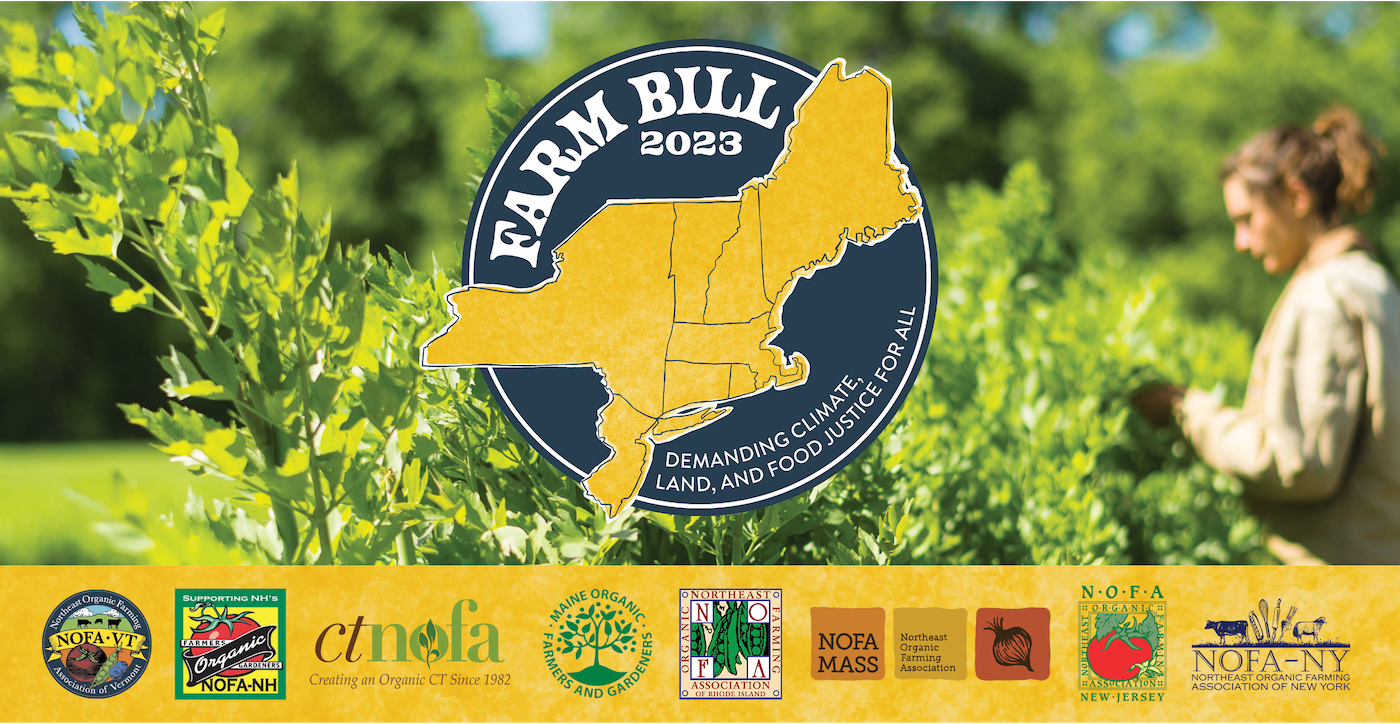Farm Bill
The Seven Northeast Organic Farming Association chapters have come together to identify our region's greatest farming and food system needs and policies that can address them. As the farm bill process unfolds, we will continue to collaborate and offer opportunities for you to inform and join in on our advocacy campaign.
At this moment of multiple crises in our world - climate, insurgent white supremacy, inequality, pandemics, conflicts both military and political - we believe that there is an urgent need for a Farm Bill that is transformative, that will set in motion the transition from a system of farming and food that exploits land, people and livestock and is guided by profit and competition. These principles came together with input gathered during spring and summer 2022 farm bill listening sessions hosted by NOFA chapters and through careful evaluation of campaigns being developed by organizations that share our values and priorities. NOFA has identified six priority policies we would like to see included in the next farm bill. We will continue to amend this list as new high priority bills and proposals emerge.
-
The forthcoming Opportunities in Organic Act, offers a suite of flexible, easy-to-access tools to reduce barriers to organic agriculture, including for Black farmers, Indigenous farmers, farmers of color and producers historically excluded from organic certification. It will modernize reimbursements for organic certification, increase technical expertise and support within public institutions and NGOs and expand support for producers transitioning to organic.
-
The Agriculture Resilience Act will harness the power of agriculture to confront our climate and biological crises. With urgent action now, including the investments and policy reforms in the ARA, we can meet our climate goals and dramatically improve our food system while engaging farmers in making the critical changes necessary for our future.
-
Immediate support to address dramatically increased organic input costs for organic dairy farms is urgently needed to reverse the alarming decline in family organic dairy farms in the northeast. Organic Farmers Association’s priorities for organic dairy will increase organic milk market transparency by requiring AMS to publish organic-specific data, invest in local infrastructure and ensure that disaster relief efforts support the specific needs of organic dairy farms. Systemic reforms such as those detailed in the Milk from Family Dairies Act are also needed to ensure farm viability and market opportunities for all family dairies.
-
USDA has a demonstrated history of discriminating against Black, Indigenous and farmers of color in lending and credit practices and program implementation. Our nation must take action now to facilitate secure, affordable access to land and access to credit for young farmers and farmers of color—there is no time to wait. The reforms in the Justice for Black Farmers Act and the Fair Credit for Farmers Act are a first step in addressing and correcting discrimination against Black farmers in farm assistance and lending programs and to ensure representation on county FSA committees.
-
Farmland that is contaminated with PFAS (aka “forever chemicals”) is a threat to public health and farm viability and must be addressed to ensure a safe and prosperous future. As PFAS contaminated soil, milk, and even produce and crops are detected, farm families and farmworkers are most vulnerable and need immediate support to protect themselves, their business, and their communities against continued exposure. The Relief for Farmers Hit with PFAS Act would authorize funding for states to assist affected farmers, expand monitoring and testing, and fund PFAS research.
-
We join with our allies across the many sectors of the food system in opposing legislation that will increase consolidation and corporate power through mechanisms that prioritize short term profit over long term sustainability, such as carbon markets and biogas markets. These false solutions focus too narrowly on carbon or methane at the detriment of biodiversity, ecosystem health and function, and allow bad actors to continue to pollute while further entrenching farmers in systems of chemically-intensive agriculture. (To learn more about what we mean by "false solutions", check out this explainer from our allies at IATP.)
Visit our action network page by clicking the image below to get involved by writing letters and urging your congressional delegates to support a transformative farm bill.


